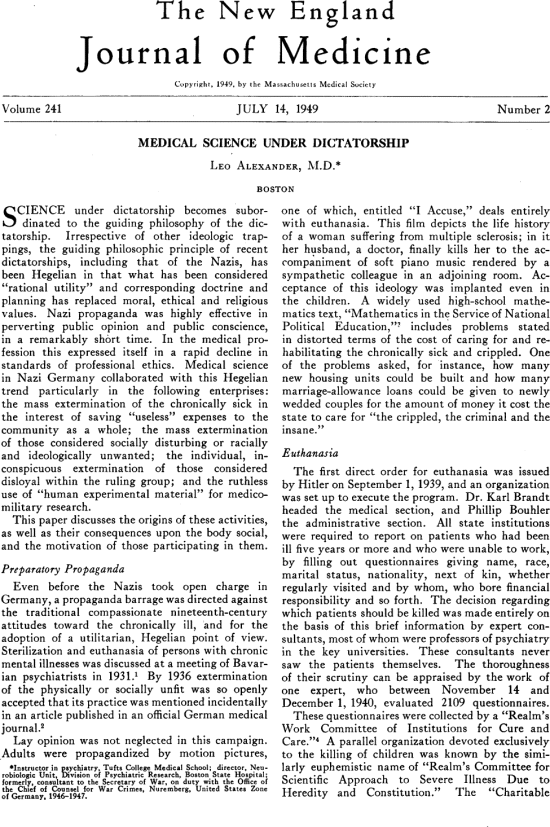In my public speaking days, I often had the chance to refer to an amazing article by
Dr. Leo Alexander, that appeared in the
New England Journal of Medicine in 1949.
Entitled, "Medical Science under Dictatorship, the article examined the numerous social reasons for the corruption of the medical community before and during the second world war.
It is a fascinating read, even today, especially when there are elements still pushing for euthanasia.
I know one must be careful in using ANY comparisons with medicine during that time.
However, there are principles and decisions that impact medicine, and either place or remove the view of "life", by that I mean the specialness of "sanctity" of human life.
What is always important, is to make sure we examine history and then learn from it.
This is just such the case.
Dr. Alexander has much to teach us, even though so many years separate us from the evil of that day....and people don't realize that it had nothing to do with the NAZIS.
For example:
Even before the
Nazis took open charge in Germany, a propaganda barrage was directed against
the traditional compassionate nineteenth-century attitudes toward the
chronically ill, and for the adoption of a utilitarian, Hegelian point of view.
Sterilization and euthanasia of persons with chronic mental illnesses was
discussed at a meeting of Bavarian psychiatrists in 1931.1 By 1936
extermination of the physically or socially unfit was so openly accepted that
its practice was mentioned incidentally in an article published in an official
German medical journal.
Lay opinion was
not neglected in this campaign. Adults were propagandized by motion pictures,
one of which, entitled "I Accuse," deals entirely with euthanasia.
This film depicts the life history of a woman suffering from multiple
sclerosis; in it her husband, a doctor, finally kills her to the accompaniment
of soft piano music rendered by a sympathetic colleague in an adjoining room.
Acceptance of this ideology was implanted even in the children. A widely used
high-school mathematics text, "Mathematics in the Service of National
Political Education," includes problems stated in distorted terms of the
cost of caring for and rehabilitating the chronically sick and crippled. One of
the problems asked, for instance, how many new housing units could be built and
how many marriage-allowance loans could be given to newly wedded couples for
the amount of money it cost the state to care for "the crippled, the
criminal and the insane."
Alexander then goes on about sterlizations, experimentations, etc. and how it was all related and "justified" for the good of society.
He then sets his sites on Western thought and attitudes...and includes a warning...answering the question everyone asks...how could it have happened?
He writes:
Whatever proportions these crimes finally assumed, it became evident to all who investigated them that they had started from small beginnings. The beginnings at first were merely a subtle shift in emphasis in the basic attitude of the physicians. It started with the acceptance of the attitude, basic in the euthanasia movement, that there is such a thing as life not worthy to be lived. This attitude in its early stages concerned itself merely with the severely and chronically sick. Gradually the sphere of those to be included in this category was enlarged to encompass the socially unproductive, the ideologically unwanted, the racially unwanted and finally all non-Germans. But it is important to realize that the infinitely small wedged-in lever from which this entire trend of mind received its impetus was the attitude toward the nonrehabilitable sick.
And one of the most powerful of quotes:
It is the first seemingly innocent step away from principle that frequently decides a career of crime. Corrosion begins in microscopic proportions.
The entire article has been put online and is available
here.
It makes for fascinating reading...and serves as a warning that we ignore the lessons of history at our own peril...and our discarding of the age-old Judeo-Christian views on life come at a price.

